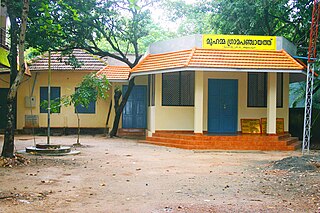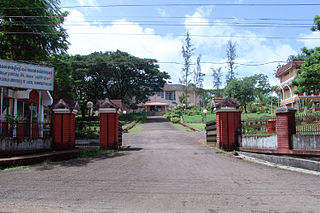Related Research Articles
A planned economy is a type of economic system where the distribution of goods and services or the investment, production and the allocation of capital goods takes place according to economic plans that are either economy-wide or limited to a category of goods and services. A planned economy may use centralized, decentralized, participatory, or Soviet-type forms of economic planning. The level of centralization or decentralization in decision-making and participation depends on the specific type of planning mechanism employed.
Decentralization or decentralisation is the process by which the activities of an organization, particularly those regarding planning and decision-making, are distributed or delegated away from a central, authoritative location or group and given to smaller factions within it.

Centralisation or centralization is the process by which the activities of an entity or organization, particularly those regarding planning, decision-making and control of strategies and policies, become concentrated within a particular group, sector, department or region within that entity or organization. This creates a power structure where the said group, known as head or core group, occupies the highest level of hierarchy and has significantly more authority, prestige and influence over the other groups, who are considered its subordinates.

The Kerala model refers to the practices adopted by the Indian state of Kerala to further human development. It is characterised by results showing strong social indicators when compared to the rest of the country such as high literacy and life expectancy rates, highly improved access to healthcare, and low infant mortality and birth rates. Despite having a lower per capita income, the state is sometimes compared to developed countries. These achievements along with the factors responsible for such achievements have been considered characteristic results of the Kerala model. Academic literature discusses the primary factors underlying the success of the Kerala model as its decentralization efforts, the political mobilization of the poor, and the active involvement of civil society organizations in the planning and implementation of development policies.

Travancore Mathew Thomas Isaac is an Indian politician and economist, who was the Minister for Finance and Coir of the Indian state of Kerala. A central committee member of the Communist Party of India (Marxist), he has authored a number of articles on economics, planning and politics, has published in leading regional, national and international periodicals, presented lectures and papers in National and International Conferences and seminars. Isaac is the author of more than 50 books, both in Malayalam and English.

Panchayati raj is the system of local self-government of villages in rural India as opposed to urban and suburban municipalities.

Rural development is the process of improving the quality of life and economic well-being of people living in rural areas, often relatively isolated and sparsely populated areas. Often, rural regions have experienced rural poverty, poverty greater than urban or suburban economic regions due to lack of access to economic activities, and lack of investments in key infrastructure such as education.

The Centre for Development Studies (CDS), Thiruvananthapuram, Kerala, India is a premier Social Science research institute. It is also a higher education institution providing M.A. course in applied economics and PhD course in economics. The institute is internationally reputed for being a centre for advanced learning in economics. Its main objective is to promote research, teaching and training in disciplines relevant to development.
Jos Chathukulam is the Director of the Centre for rural management, Kottayam, Kerala, India.
The Kerala State Planning Board is an advisory board under the Government of the State of Kerala, India. It was constituted in 1967 with Chief Minister as Chairman and a non-official as part-time Vice-Chairman. The board assists the state government in formulating a development plan based on a scientific assessment of the resources available to the state. A comprehensive economic review of the state is prepared by the board every year.

Kerala Institute of Local Administration, abbreviated as KILA, is an autonomous training, research and consultancy organisation constituted under the Ministry of Local Self Government, Government of Kerala, registered as per Travancore – Cochin Literacy, Scientific and Charitable Societies Act-1955. KILA was established in 1990, in the pattern of a national institute, with the main objective of supporting local governance.
Kerala is a state on the southwestern coast of India. It is known for its high literacy rate, low infant mortality rate, and long life expectancy.
Municipal or local governance refers to the third tier of governance in India, at the level of the municipality or urban local body.
Local government in India is governmental jurisdiction below the level of the state. Local self-government means that residents in towns, villages and rural settlements are the people who elect local councils and their heads authorising them to solve the important issues. India is a federal republic with three spheres of government: union, state and local. The 73rd and 74th constitutional amendments give recognition and protection to local governments and in addition each state has its own local government legislation. Since 1992, local government in India takes place in two very distinct forms. Urban localities, covered in the 74th amendment to the Constitution, have Municipality but derive their powers from the individual state governments, while the powers of rural localities have been formalized under the panchayati raj system, under the 73rd amendment to the Constitution.
Land reform refers to efforts to reform the ownership and regulation of land in India. Or, those lands which are redistributed by the government from landholders to landless people for agriculture or special purpose is known as Land Reform.

The Indian state of Kerala has a strong presence of communist politics. Today, the two largest communist parties in Kerala politics are the Communist Party of India (Marxist) and the Communist Party of India, which, together with other left-wing parties, form the ruling Left Democratic Front alliance.

Centre for Public Policy Research (CPPR) is an independent non-profit research organization located in Kochi, India. It was established in the year 2004. It conducts professional research, integrating developments in the areas of education, livelihood, governance, urban reforms and environment. The four focus study centers are: CPPR Centre for Urban Studies, CPPR Centre for Comparative Studies, CPPR Centre for Strategic Studies and CPPR Academy.

The Panchayat raj is a political system, originating from the Indian subcontinent, found mainly in India, Pakistan, Bangladesh, Sri Lanka, and Nepal. It is one of the oldest systems of local government in the Indian subcontinent, and historical mentions date to around 250 CE. The word raj means 'rule' and panchayat means 'assembly' (ayat) of 'five' (panch). Traditionally, panchayats consisted of wise and respected elders chosen and accepted by the local community. These assemblies settled disputes between both individuals and villages. However, there were varying forms of such assemblies.
Patrick Heller is an American sociologist and the director of the development research program at the Watson Institute for International and Public Affairs at Brown University.
Malayil Abraham Oommen is an economist and academic from Kerala, India. He wrote several books and published many articles on issues such as democracy, development, decentralization and economy of Kerala and India. He worked as economic adviser to the Botswana government.
References
- ↑ Peoples planning : kerala's dilemma by K P Kannan, Seminar 485 2000
- ↑ Sivaramakrishnan, K.C. (2006). People's Participation in Urban Governance: A Comparative Study of the Working of Wards Committees in Karnataka, Kerala, Maharashtra and West Bengal. New Delhi: Concept Publishing Company. p. 140. ISBN 8180693260.
- ↑ Prakash, B.A. (2004). Kerala's Economic Development: Performance and Problems in the Post-Liberalization Period. New Delhi: SAGE Publications India. p. 373. ISBN 0761932933.
- 1 2 Kumar, T.M. Vinod (2017). E-Democracy for Smart Cities. Berlin: Springer. p. 79. ISBN 9789811040344.